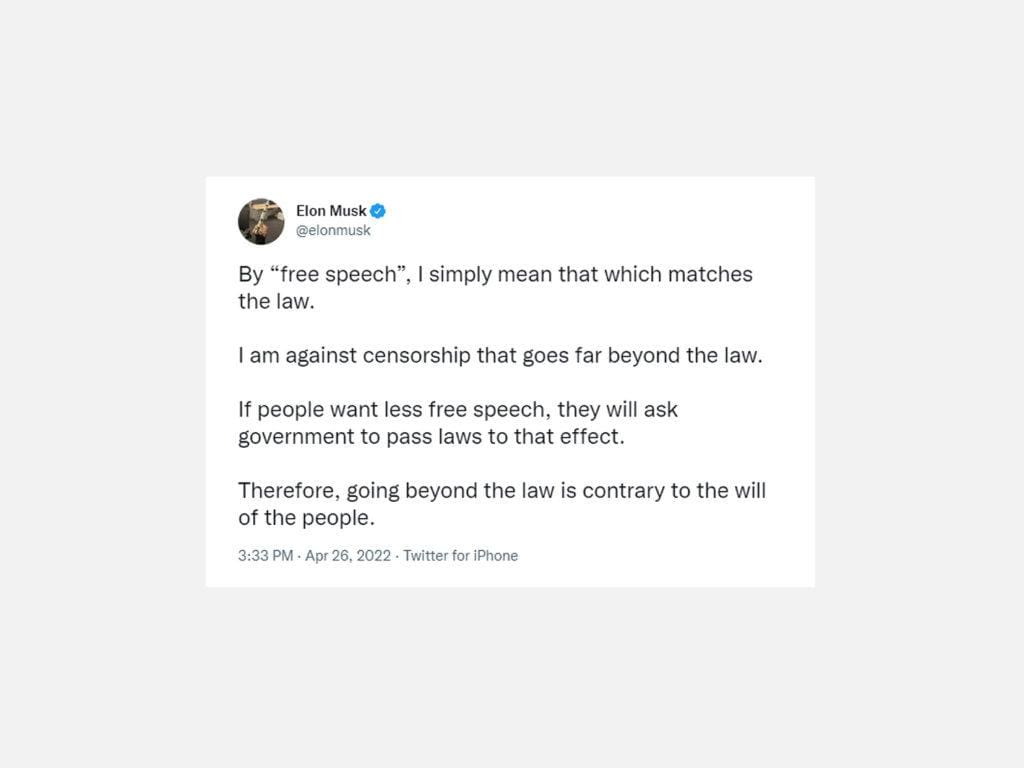Aspiring Twitter owner and current Tesla CEO Elon Musk has indicated that if he succeeds in buying the social media platform, its content moderation policies will reflect the bounds of the law. Human Risk Limited founder Christian Hunt writes that while Musk’s tweet shows an apparent lack of understanding for ethics or compliance, it inadvertently provides some interesting insights in the field.
This content has been adapted from Hunt’s own social media post. View the post and associated comments on LinkedIn.
Here’s why I think it is of interest. Musk intends to use the law as the guard rail for running his business. In simple terms, if it’s legal, he’ll do it. If it’s not, he won’t. While that might sound appealing, it’s also a recipe for disaster.
Ethics
We all know that the law is not always a good guide to what’s right. This is true in part because the law, like regulation, tends to operate on a backward-looking basis, focusing on preventing yesterday’s bad outcomes from reoccurring rather than preventing tomorrow’s.
Perhaps that’s not surprising, given some of the lawmakers we’ve managed to elect in recent years. Remember the digital illiteracy on display when Zuckerberg went in front of U.S. legislators?
Just because you can doesn’t mean you should. If you get your ethical guidance from the law, you’re highly likely to end up making unethical decisions. Probably not the best idea if your business is in a sector that’s already under scrutiny for ethics.
Compliance
Musk’s tweet implicitly acknowledges that the rules that apply to Twitter’s business — from data protection to libel — will differ by jurisdiction. Yet the company operates on a cross-border basis — the legal case around Musk’s “pedo guy” tweet being a good example — and as rules inevitably tighten around social media, there is bound to be regulatory divergence between jurisdictions.
It’s hard to hang on the regulatory cliff edge when you don’t necessarily know which cliff is relevant and where the cliff edge can move. Saying you’ll comply with whatever you need to as and when overly simplifies what compliance involves. It also means you’ll be firmly on the regulatory radar rather than under it.
What I think Musk has done here — and I’m aware that it may just be performative — is provide an example of how the tech mantra of “move fast and break things” — in other words try stuff, see what happens and don’t worry if things don’t work out — has limits.
It’s great when you’re operating in a test environment. But it is less well-suited to ethics — doing the right thing isn’t generally a moveable feast — or compliance. After all, regulators will pay close attention to what you do and how you respect both the spirit and letter of the rules. Cliffhangers pose regulatory risk, so they come under greater scrutiny.
Most of you don’t work for Musk. But his attitude isn’t unique to him. So, it’s worth thinking about why his approach is potentially risky so you’re well-prepared if you hear those same arguments.



 Christian Hunt is the founder of Human Risk Limited, a consultancy and training firm that specializes in applying behavioral sciences to the field of ethics and compliance. He has a background in financial services and was formerly the COO of the Bank of England’s Prudential Regulation Authority.
Christian Hunt is the founder of Human Risk Limited, a consultancy and training firm that specializes in applying behavioral sciences to the field of ethics and compliance. He has a background in financial services and was formerly the COO of the Bank of England’s Prudential Regulation Authority.









